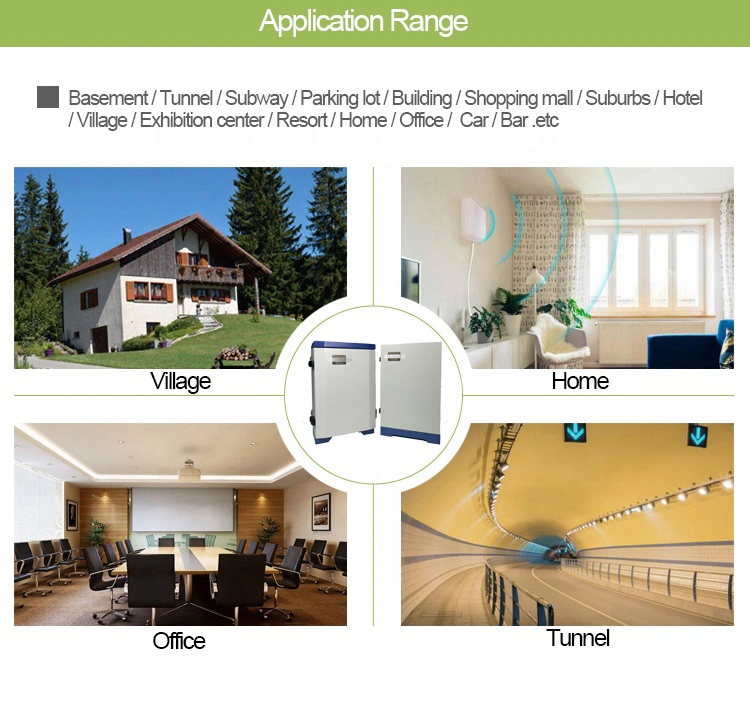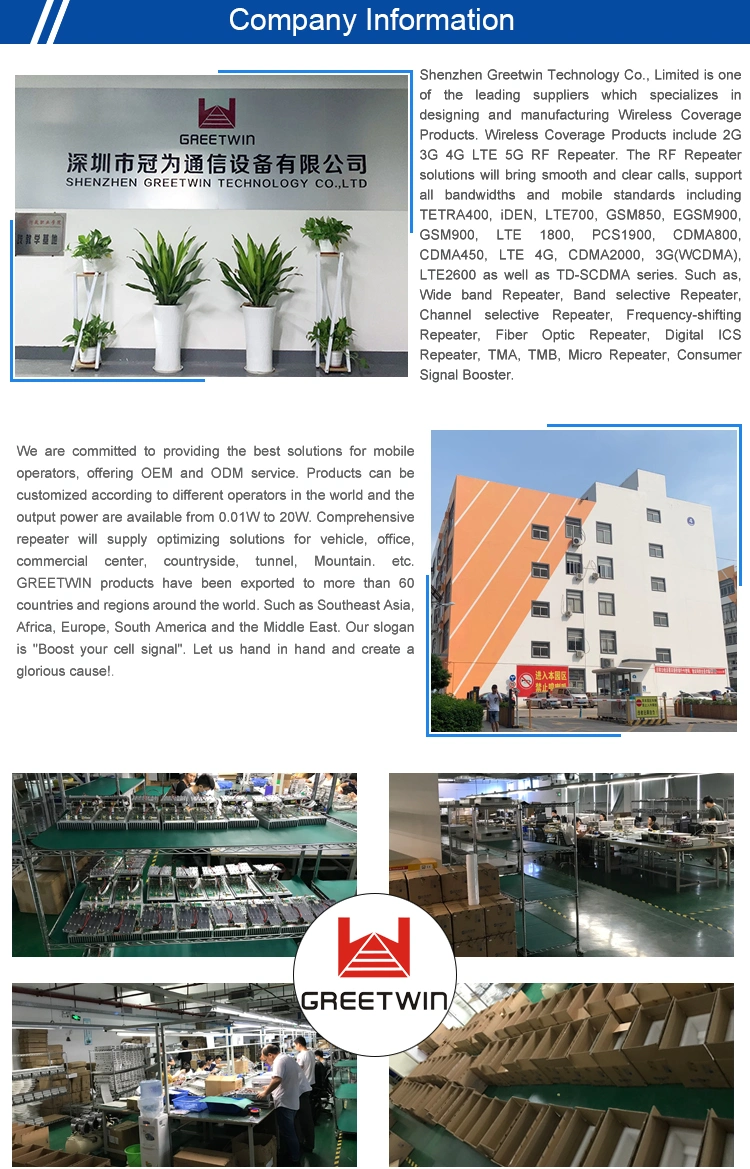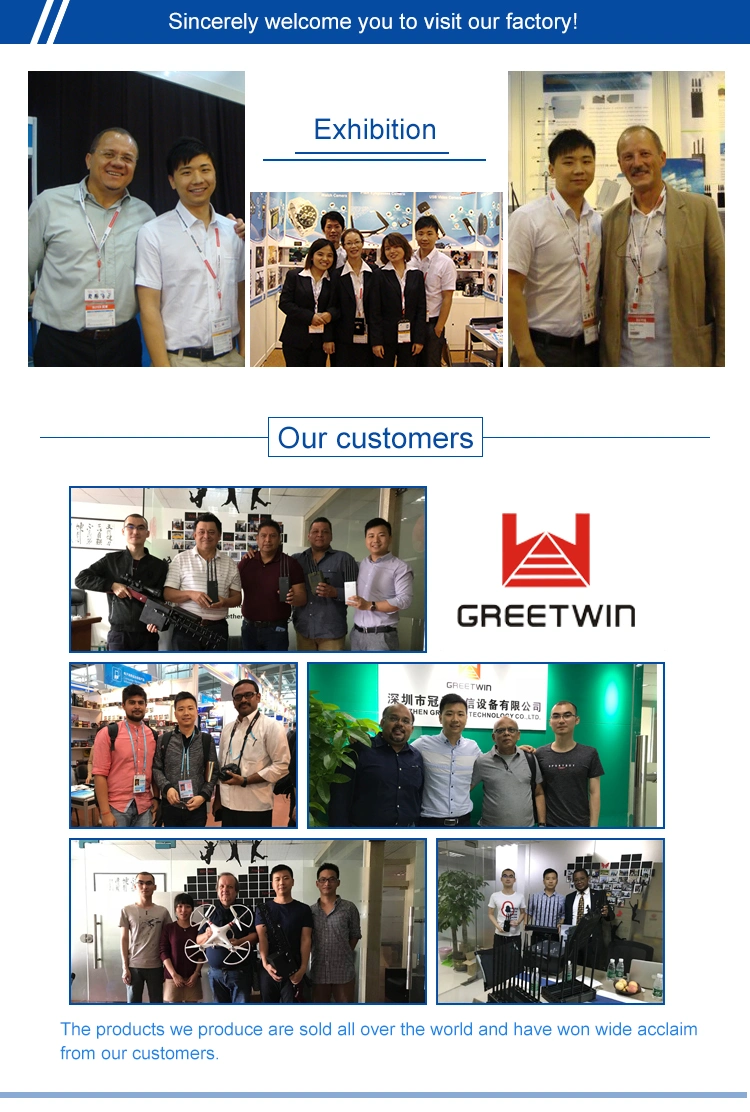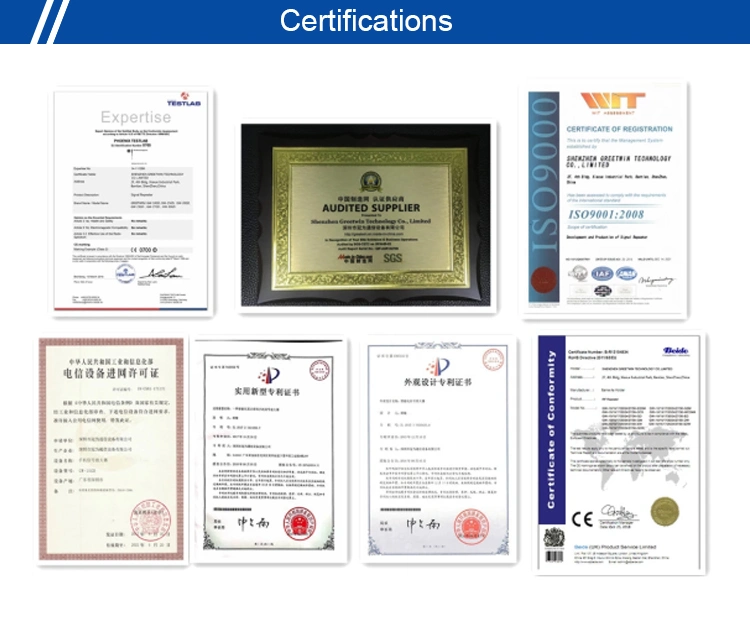
Features:
· Aluminum-alloy casing has a high resistance to dust, water, and corroding;
· Omni-directional coverage antenna can be adopted to expand more coverage;
· Tx/Rx control and alarm messages can be transmitted via one fiber optic cable;
· Adopting WDM (Wavelength Division Multiplexing) module to realize long-distance transmission;
· Stable and improved signal transmission quality;
· One Donor Unit can support up to 4 Remote Units to maximize utilization of fiber optic cable;
· USB port provides a link to a notebook for local supervision or to the built-in wireless modem to communicate with the NMS (Network Management System) that can remotely supervise the repeater's working status and download operational parameters to the repeater.
The FOR is mainly applicable to such case:
· Underground fiber optic cable network already exists beneath the area to be covered;
· There is huge obstructive terrain between the BTS and the area to be covered;
· The distance between the BTS and the area to be covered is 20 km around.
In comparison with RFR (RF repeater) and FSR (frequency shift repeater), the FOR has the following benefits and disadvantages:
Pro:
No more self-oscillation and easy to choose installation location;
For the Cable-Access type, pure BTS signal picked up by the Donor Unit will greatly reduce the signal noise;
The Remote Unit can be installed out of the BTS coverage;
Full 360-degree coverage can be realized;
No need to occupy frequency resources as the link frequency.
Con:
· The total cost of equipment is higher;
· A fiber optical connection between the Donor Unit and Remote Unit is required.
| Items | Uplink | Downlink | |||||||
| Frequency Range | DCS | 1920 ~ 1980 MHz | 2110 ~ 2170 MHz | ||||||
| Max. Gain | 90 dB | 95 dB | |||||||
| Bandwidth | 200K | ||||||||
| Channels Number | ≤ 8 Channels | ||||||||
| Manual Gain Control | 31dB in step of 1dB | ||||||||
| Automatic Gain Control | > 20dB | ||||||||
| Ripple in Band | ≤ 3dB(Typical) | ||||||||
| Out of Band Rejection | ± 400 KHz ≤ -20 dBc | ||||||||
| ± 600 KHz ≤ -30 dBc | |||||||||
| ± 1 MHz ≤ -40 dBc | |||||||||
| ± 5 MHz ≤ -50 dBc | |||||||||
| Max. Input Power Without Damage | 0 dBm | ||||||||
| Output Power | 33 dBm | 40 dBm | |||||||
| Intermodulation Products | 9KHz~1GHz | ≤ -36 dBm | ≤ -45 dBc | ||||||
| 1GHz~12.75GHz | ≤ -30 dBm | ≤ -45 dBc | |||||||
| Spurious Emission | 9KHz~1GHz | ≤ -36 dBm | ≤ -36 dBm | ||||||
| 1GHz~12.75GHz | ≤ -30 dBm | ≤ -30 dBm | |||||||
| Frequency Stability | ≤ 0.01 ppm | ||||||||
| Noise Figure @ max. gain | ≤ 5 dB(Typical) | ||||||||
| Return loss | ≤ -14 dB | ||||||||
| Time Delay | ≤ 4.5 μ s | ||||||||
| MTBF | > 50000 hours | ||||||||
| Power Supply | AC: 90~265V, 50/ 60Hz | ||||||||
| Power Consumption | < 250W | ||||||||
| Impedance | 50 ohm | ||||||||
| LED indication | Power LED | DC ON/OFF | |||||||
| Alarm LED | Normal: Green; Any Alarm Heppen: Red | ||||||||
| Remote/ Local Control | Local: Via RS232; Remote: Via wireless Modem | ||||||||
| RF Connector | N-Female | ||||||||
| Switch | Power Switch\Battery Switch | ||||||||
| Cooling | Heatsink Convection cooling | ||||||||
| Dimensions (D x W Hx ) | 420x650x170 mm | ||||||||
| Weight | < 35 Kg | ||||||||
| Installation Type | Wall Installation (or Pole Mount) | ||||||||
| Environment Conditions | IP65 | ||||||||
| Humidity | < 90% | ||||||||
| Operating Temperature | -10º C~55º C | ||||||||
The whole FOR system consists of two parts: Donor Unit and Remote Unit. They transparently convey and amplify the wireless signal between the BTS (Base Transceiver Station) and mobiles via fiber optic cables.
The Donor unit captures the BTS signal via a direct coupler closed to the BTS (or via open-air RF transmission through the Donor Antenna), then converts it into optic signal and transmits the amplified signal to the Remote Unit via fiber optic cables. The Remote Unit will reconvert the optic signal into the RF signal and provide the signal to the areas where network coverage is inadequate. And the mobile signal is also amplified and retransmitted to the BTS via the opposite direction.
As per the method of receiving BTS signal by the Donor Unit, two types of FOR are available:
Cable-Access FOR: To receive BTS signal via a direct coupler closed to the BTS (recommended);
Wireless-Access FOR: To receive BTS signal via a Donor Antenna (applicable when no fiber optic cable connecting to the BTS); Can be sorted into 2 sub-categories: Band-Selective and Channel-Selective.






Q1. Could I get a sample before bulk order?
Yes, we offer the sample for all models but charged.
Q2. What should I do if I don't know about frequency in my country?
Please feel free to contact us with your inquiry, we will find the frequency you need and address your problems.
Q3. Do you accept OEM/ODM order?
Yes, we can customize the brand logo, colors, and frequencies.
Q4.Shipment Date
| Sample | 3-5 business days |
| <20 pcs | 7-15 days |
| 20-50 pcs | 15-24 days |
| >50 pcs | Negotiate |
Q5: Delivery Date of the sample by DHL/FedEx
| USA/Canada/Europe/Asia | 3-5 days |
| Middle East/Latin American | 5-7 days |
| African | 3-7 days |
Q6.Payment Method
T/T, Western Union, Paypal, and Credit Card are available,
but we suggest paying by Alibaba Trade Assurance, the most favor, and security method.
*Other methods please contact us with more details.
Q7.Others
(1)Frequency
We can customize Single/Double/Triple/Quand/Penta Band for cellphone signal like 2G/3G/4G(GSM/CDMA/DCS/PCS/WCDMA/LTE, etc,)
(2)Output Power &Coverage Areas
| Output Power | Coverage Areas |
| 20dBm | 500-1500m² |
| 23dBm | 1500-2500m² |
| 25dBm | 2500-4000m² |
| 27dBm | 3000-5000m² |
| 30dBm | 5000-8000m² |
*Coverage is related to local signal strength, please contact us with your local condition, we can offer the best solution.
(3)Antenna
Cellphone signal booster must attach one indoor antenna and one outdoor antenna by two coaxial cables.
Website's price only includes a signal booster, please contact us if you need one set of devices with antenna, splitter, and coupler.